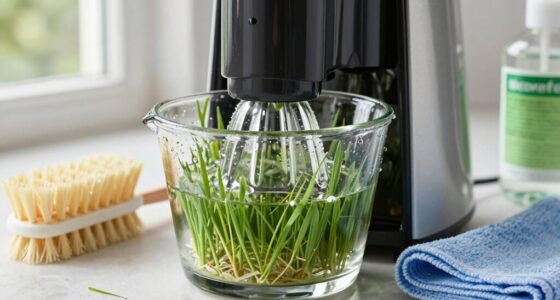When you have a cold, try drinking orange juice for a boost of vitamin C, which supports your immune system. Pineapple juice can help alleviate congestion with its bromelain content, while watermelon juice hydrates you and offers antioxidants. Ginger juice, combined with lemon, soothes your throat and aids digestion. Finally, beet juice supports your overall health but may not be as tasty. Explore more options and tips to feel better fast!
Key Takeaways
- Orange juice provides high vitamin C, boosting the immune system and alleviating cold symptoms like a sore throat.
- Pineapple juice contains bromelain, which helps relieve mucus buildup and sinus congestion, making breathing easier.
- Watermelon juice is highly hydrating and rich in antioxidants, aiding overall recovery and maintaining fluid balance.
- Ginger juice, especially combined with lemon, soothes sore throats and respiratory issues while providing anti-inflammatory benefits.
- Beet juice, although less palatable, offers nitrates and potassium, which support blood flow and overall health during illness.

When you’re battling a cold, choosing the right juice can make a significant difference in how you feel. One of the most popular choices is orange juice, and for good reason. Just three-quarters of a cup provides nearly a full day’s worth of vitamin C, a vital nutrient that supports your immune system. This boost in vitamin C can help alleviate symptoms like a runny nose and sore throat, allowing you to feel a bit more comfortable as you recover. Not to mention, the refreshing taste can be a nice pick-me-up when you’re feeling under the weather. Additionally, it’s essential to be mindful of how much juice is healthy daily, as excessive consumption can lead to excess sugar intake. Moderation is key; aim for half a cup of juice and balance it with whole fruits to maximize nutrition. Other juice options, like cranberry or apple, can also provide benefits, but orange juice remains a top contender for cold relief.
Another excellent option is pineapple juice. This tropical delight contains bromelain, an enzyme known for its anti-inflammatory effects. If you're dealing with mucus buildup or sinus congestion, pineapple juice might just be the relief you need. It can help clear your airways and make breathing easier. Plus, its natural sweetness can be quite soothing when you're trying to hydrate and nourish your body during this time.
If hydration is your priority, consider watermelon juice. With over 90% water content, it's incredibly hydrating, which is crucial when you're sick. It's also rich in lycopene, an antioxidant that supports immune health and helps reduce inflammation in your body. Staying hydrated not only helps you feel better but also aids your immune system in fighting off the illness.
Don't overlook the power of ginger juice, either. When combined with lemon, it creates a potent remedy for cold symptoms. The vitamin C from lemons works in tandem with ginger's anti-inflammatory properties to soothe your sore throat and alleviate respiratory issues.
Ginger juice can also help settle an upset stomach, which sometimes accompanies colds. The warmth and spice of ginger can invigorate your senses, helping you feel more alert even when you're feeling down.
Beet juice is another option that you might find beneficial. Rich in nitrates, vitamin C, and potassium, it can help boost blood flow and oxygen delivery to your cells, aiding your recovery. While it may not have the same immediate flavor appeal as orange or pineapple juice, its benefits for your overall health during a cold are worth considering.
Frequently Asked Questions
What Juice Is Good for a Cold?
When you're feeling under the weather, choosing the right juice can really make a difference.
You might want to try orange juice for its vitamin C, which supports your immune system.
Pineapple juice could help with mucus buildup due to its bromelain content.
If hydration's a priority, watermelon juice is refreshing and full of antioxidants.
For a nutrient boost, consider beet juice or a blend of carrot and apple juice to enhance your recovery.
What Drinks Are Good for Fighting a Cold?
When you're under the weather, it's important to hit the ground running with the right drinks. Hydration is key, so water, herbal teas, and broths can do wonders.
If you want a boost, consider juices like orange or ginger-turmeric; their vitamins and antioxidants can support your recovery.
You'll also find that lemon ginger juice can soothe a sore throat while keeping you refreshed.
What Juice Is Best for Congestion?
When you're dealing with congestion, several juices can really help.
You might want to try pineapple juice for its bromelain, which can reduce mucus buildup.
Grapefruit juice is packed with vitamin C, which thins mucus, too.
If you're looking for soothing relief, lemon ginger juice combines ginger's anti-inflammatory properties with vitamin C.
Orange juice is a classic, boosting your immune system, while beet juice enhances blood flow, supporting respiratory function.
Is It Good to Drink Juice in the Cold?
Drinking juice in the cold can be beneficial for you. Fresh-squeezed juices, like orange or lemon, pack a punch of vitamin C, which supports your immune system.
They also help keep you hydrated, especially when you choose juices with high water content, such as watermelon. Just be sure to avoid added sugars, as they can irritate your throat.
Juices with ginger or turmeric can also help reduce inflammation, making you feel better overall.
Conclusion
When you're feeling under the weather, sipping on the right juice can work wonders. Freshly squeezed orange juice packed with vitamin C or a soothing ginger-lemon concoction can help ease your symptoms and boost your immune system. So, don't just sit there like a character in a black-and-white movie; pour yourself a glass and give your body the hydration and nutrients it craves. Your cold won't stand a chance against these delicious drinks!
Cindy thoroughly researches juicing trends, techniques, and recipes to provide readers with practical advice and inspiration. Her writing style is accessible, engaging, and designed to make complex concepts easy to understand. Cindy’s dedication to promoting the advantages of juicing shines through her work, empowering readers to make positive changes in their lives through the simple act of juicing.











